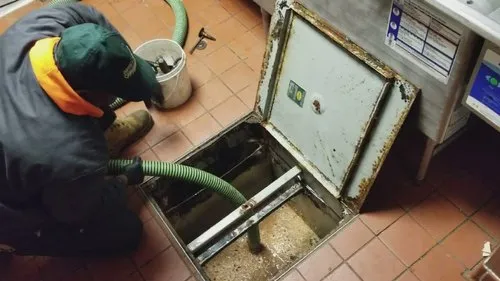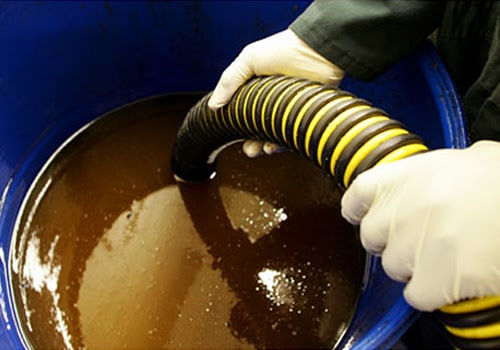After installing the right-sized grease trap for your business, you need to stay on top of its health status all the time. This means you need to ensure that the FOG (fats, oils, and grease) tank is cleaned in good time to prevent overflowing, awful smells, and other problems.
The rule of thumb for grease trap cleaning is that if 25 percent of is filled with FOG, you need to clean it out immediately. The reason for this is that a FOG tank that is more than a ¼ full of grease is not efficient and will pass grease to the sewerage system.
For efficiency, it is best to contract a company to regularly clean the grease trap for you. That way, you will never miss a cleaning schedule, as doing so could have serious repercussions.
The recommended cleaning frequency is once every 30 to 90 days. But that is not cast in stone. At times, you may have to do it sooner, at other times later.
Here are some of the reasons why you need to schedule grease trap service today:
1. When there is a stench coming from the grease tank
By the time an awful smell has started backing up into the kitchen, it is too late, and you have delayed too long to clean the FOG trap.
This smell comes from the rotting action of the grease caused by bacteria. When the food materials breakdown, hydrosulfuric gas forms, and it can corrode metal parts. If your FOG tank is made of steel, it can start corroding and this shortens its lifespan.
But even if the trap is not made of steel, the awful smell coming from it can drive your customers away. It can also make your kitchen employees sick once it starts backing up to the sinks.
Mostly, the grease tank starts developing the rotting egg or sewage smell when cleaning is overdue. Therefore, if there is no clogging, the stench should go away as soon as the contractor vacuums the grease and cleans the tank.
2. To avoid kitchen downtimes
The kitchen is the soul of your business, and you want to keep it running all the time. When people come to your restaurant, it is because they are hungry. If you cannot serve them in good time, they will move on to your competitors and give you a bad rap on social media.
Experiencing a stench from an overflowing grease trap will not help either, as they will also go away. If the FOG tank is not cleaned in time, it causes the noxious smell to back up into the kitchen through the sinks. If this happens, food preparation has to stop, until the problem is rectified.
These gases can also make your kitchen employees sick. To prevent this from happening, outsource the grease trap pumping to a responsible contractor.
They will always show up in the due time, clean everything, check the grease tank for repairs, and bill you for the work. If you do not have to worry about such tasks, you can dedicate more time to other areas of your business.
Clean your FOG interceptor on time to keep your kitchen healthy, and clean. A grease trap that is not cleaned in time could cause clogging problems, which would prevent proper draining of the sinks.
3. If the grease trap is full
It is quite common to experience seasonal surges in the food business, meaning there is more work in the kitchen. If this happens, you may have to vacuum the grease tank sooner than scheduled. Call your contractor so that they can send a team over.
The FOG tank can fill up due to too much water getting in, or the kitchen staff dumping too much grease directly into the sink. The only option is to clean the tank as soon as the FOG level gets to ¼ of the tank.
The FOG tank can also fill up faster than expected if there is clogging in the outlet pipe. This would prevent the outflow of water into the sewer channels.
The technicians will check for any clogging problems in the trap, and rectify them to avoid a similar occurrence in the future.
Since the water from the kitchen will keep coming in, the tank fills up quickly. Remember, the FOG float on the water and as more water comes in, the block of grease will start pushing against the lid.
If the water in the sink drains too slowly, you need to have the grease interceptor checked, immediately.
4. To keep everything orderly and maintain your reputation
A clean grease tank gives you peace of mind. Also, you are not worried about customer satisfaction because they will be dining in a clean environment.
Schedule for a FOG tank cleaning as soon as you have come through a surge on business, perhaps after a busy weekend or holiday season.
If you notice any signs of a problem with your kitchen plumbing system, it is most likely related to the grease trap. You should have it checked as soon as possible before any customer realizes something is amiss. A single negative post on social media could dent the reputation that took you so long to build.
When you see any signs of seepage around the area where the FOG tank is installed, it needs checking. Contact Grease Collection, a grease trap cleaning company immediately to pump the tank and check for any issues.
5. When too many FOG have been finding their way into the grease trap
Sometimes, the kitchen employees make mistakes and unknowingly allow too much grease to go to the FOG trap. If you notice that this has been going on for some time, you need to have the tank cleaned immediately. There is no sense in having to wait until the inlet pipe of the tank is clogged, and the sinks start overflowing with dirty water.
Also, if you have not installed strainers on the sinks to prevent the food materials from going down the sink, have the grease trap sooner. These solids settle at the bottom of the first chamber of the tank, causing it to fill up faster.
If the kitchen has been super busy lately, assume the worst and schedule a grease trap check. This will give you peace of mind, so you can concentrate on other aspects of your business.
Conclusion
If you run a school, hospital, nursing home, a restaurant, candy shop, or any other place that sells food, the law requires you to install a grease trap.
You also have a moral responsibility to avoid dumping the used cooking oils in the landfills, or in the sewer channels. Arrange for grease collection so that your old cooking oils can be recycled to biofuel. Whatever grease cannot be recycled, such as that from the grease tank, the grease collection service will safely dispose it, to protect the environment and the water sources.


